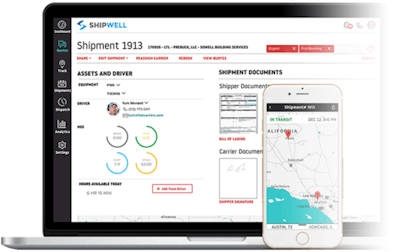For small fleets and independent owner-operators, the new Shipwell.com platform is anchored by a mobile app and web-based dashboard with a variety of tools that offer carriers opportunity to negotiate loads within the universe of freight shippers and brokers utilizing the platform. Readers would be correct in placing the company among the growing crop of online freight platforms attempting to automate elements of the freight transaction and information sharing among parties, while streamlining other parts with online tools.
Shipwell, the company says, connects both shippers and brokers with carriers in “one platform for faster quoting, dispatching, tracking and communicating.” Unlike a traditional TMS (Transportation Management Software) system, the company doesn’t “have a big upfront cost or lengthy contract,” says Jason Traff, cofounder of the Austin, Texas-based company. “Instead, we take a small commission on shipments booked through the system. We also charge a monthly fee for users with multiple accounts,” such as those of a broker of some size “managing multiple shippers or a shipper managing multiple vendors.”
For carriers, the system is free to use until “they have 10 power units, trailers or drivers, and after that, they pay a monthly fee for access to the carrier dispatch and tracking platform.”
 Shipwell’s mobile app is available for Android and iOS devices. From a dispatch dashboard via the online system available to carriers as they grow, carriers can also manage capacity and freight offers from shipper/broker partners.
Shipwell’s mobile app is available for Android and iOS devices. From a dispatch dashboard via the online system available to carriers as they grow, carriers can also manage capacity and freight offers from shipper/broker partners.The company has integrated its platform with a number of electronic logging device providers and its own mobile app through advance development, and now boasts of 100 fleets controlling “nearly 500,000 trucks” in its network. Those fleets comprise businesses of all size categories across the spectrum of trucking, “from owner operators and small fleets all the way to some of the biggest names in the industry, like FedEx and UPS.”

Something of a test case for the system with the Lumi startup, making custom packaging for e-commerce businesses, saw results. The company reportedly reduced the 10 hours they once spent “getting freight quotes through multiple emails, phone calls and websites” to just 2 hours weekly, Shipwell says.
“We are currently shipping for hundreds of businesses,” says Traff when asked about freight volumes running through the system. “We and our 3PL channel partners have focused on how freight is currently moved, which has not traditionally been the real-time marketplace/Uberization of freight model, and so most of our platform’s volume comes from routine and contracted loads” at this point. For carriers, generally, he adds that “our preference is to always match carriers with routine shipments that align with their avaialable hours … and maximize their time at home.”
The company says it’s building toward an ultimate goal of complete transparency for multiple parties “into a shipment’s price, transit time, and status. By knowing where freight capacity is and how it compares to demand, Shipwell will be able to automatically optimize and tighten supply chains across multiple modes of transportation.”










